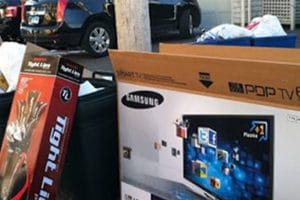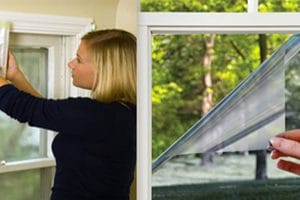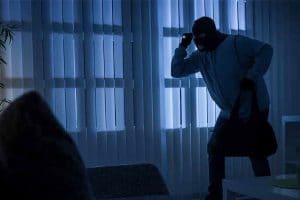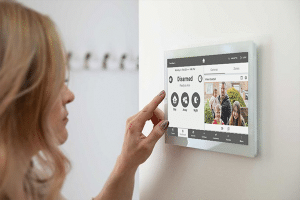Your cart is currently empty!
Category: Homeowner Tips
-

Home Safety To-Do List
Before summer explodes upon us, let’s take time to do some home improvements that will help make your dwelling more secure.
Exterior maintenance goes hand-in-hand with home security. Here are six must-do tasks to tackle.
Even if it’s not quite warm enough in Georgia to get the A/C cranked up, it’s a good idea to do a quick visual inspection of your units. Perform basic service and replace the filters. It’s not too early to call in an expert to check the performance and parts of your air conditioner, either. An A/C unit that’s on the fritz can mean comfort and safety issues for everyone in the home.
1. Do Basic Landscape Maintenance.
Remove dead shrubs and trees. Clear out fallen debris and branches. You don’t want to leave any overgrown areas near the home that could provide cover for prowlers.
2. Inspect Your Tools and Tool Storage.
Ensure that gasoline tanks and power tools are stored properly. Check for rust and broken doors and locks on exterior storage sheds, outbuildings basements, and garages. Broken locks and yard tools are an easy mark for burglars.
3. Take a Walk at Night to Check Your Lights.
Stroll around your home at nightfall. Look up at your security lights on your roofline, the corners, and especially the lights on your entrances, front door, and driveway. Make sure all of them are clean of debris and dirt and have working bulbs. Pay special attention to your exterior motion sensor lights – make sure they’re coming on and off like they’re supposed to do! Motion sensors are an important part of your home’s security
4. Examine Your Door and Window Frames.
Winter weather can take a toll on the detailing around doors and windows, making the frames vulnerable to burglars using tools to break into a home. Recalk as necessary and/or make repairs if they’re rotted or damaged in any way.
5. Protect It.
Now that you’ve read about why home maintenance is essential to keeping your home secure, why not give it the ultimate level of safety?
An EMC Security alarm system can help you keep track of your home’s interior and exterior spaces with a touch of your smart phone. One low price per month, with no contract, ensures that your home is protected with and our 24/7 professional monitoring.
Call us at 770-963-0305.
-
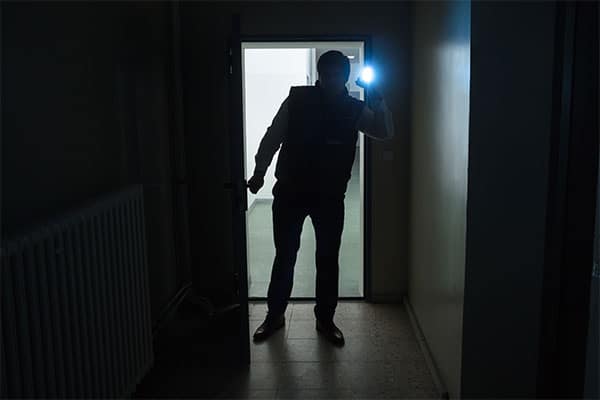
Stop Thief!! Prevent a Burglary at Your Home
A break-in can be extremely scary and intrusive.
If you’ve ever talked to someone that’s experienced a break-in they will tell you they almost feel….violated. And afraid. I talk from first-hand experience.
My goal is to help you to prevent this from happening at your house. So we’ve compiled a list of lesser-known tips to prevent break-ins before they happen.
list #1:
1. Prevent boxes from leaking info
Leaving the electronic boxes (for a TV, laptop, ipad or phone) on your driveway delivers the message to criminals that you have valuable things in your house. An improvised home security idea you can adopt is to tear down the boxes to store inside the trashcan or haul them to the dump right away.
2. Use window film for added privacy
Front doors with side pane glass look nice but add a home security complication: privacy. At night, you can see right through these windows into your yard. While it’s good that you can see other people, it’s bad that they can see you. For just a few dollars, add decorative window film to solve the problem.
3. Place car keys near your bed
Keeping your car keys near your bed while you sleep is one of the lesser known but effective tips. In case you hear any abnormal sound in your garage, you can press the car alarm panic button to scare away the potential thief who tries to break into your car.
4. Avoid hiding things in the bedroom
The master bedroom is one of the first places burglars look after entering a house. Take a quick inventory of what you keep in your master bedroom. Is there jewelry, electronics, cash, or credit cards? Anything of value that can easily be moved should be relocated to somewhere unexpected. Few criminals would think to check for valuables in these places. Doing the unexpected can save you in the long run.
continued...
-

The Master Bedroom – A Burglar’s #1 Go-To
“If you can get guns, they are easier to sell,” said Jerome Gilgan, a former burglar who now works as a rehabilitation counselor.
Some burglars admitted to seeking out the safe or lockbox first.
“A safe to me, is my goal item to locate. I would leave everything else to get this, nothing means more to me than the safe.”
Where can all these items be found? The Master Bedroom.
Burglars will go to any length to scour this room full of valuables. The jewelry box, guns in the closet, cash in a drawer, and even things under the floor boards. Our sactuary, our safe-place is actually the most vulnerable to thieves.
How can you keep your valuable safe?
- Use a LARGE, HEAVY safe. It is not easy to carry.
- Use smart-lighting and cameras to deter criminals.
- Be a good neighbor. Watch your neighbor’s house and ask for it in return.
- Install and arm your security system. A burgler is 3 times as likely to break-into a home without one.
Jewelry and guns are almost as good as cash.
As a follow-up to a previous blog, What Burglars are Looking For, Let’s expand on the Master Bedroom.
The main item a burglar is looking for in your home is cash, or something that can be sold for cash.
“The first thing [I look for] is anything of monetary value,” a burglar wrote in a 2017 poll of 86 convicted burglars.
-

7 Things To Do If Your Identity Is Stolen
Each year, millions of Americans fall victims to identity theft, resulting in loss of money, but also a huge consumption amount of time and energy on their behalf.
So what should you do if your identity gets stolen? Here are 5 simple things you can do to reduce the damage.
File Reports
You will need to file two reports to the officials — one with the Federal Trade Commission and one with your local police department. The FTC does not have the ability to pursue criminals but law enforcement agencies like the FBI use information collected by the FTC. So this is an important step in helping protect others from criminal activity. Then, file a report with your local police department. Filing a report will likely not assist the police in the event your identity was stolen online, but it does protect you.
Begin a paper trail
Once you’ve verified your information has been compromised, take an account all of the steps you’ve taken in an attempt to clear your name. This includes noting emails/phone calls by date, time, contact, and resolution status. Mail documents with a return receipt request so you have a record of those transactions. Some types of fraud have a timeframe for reporting, so create a calendar to ensure you don’t miss any important deadlines.
Tighten security on your accounts
Cybersecurity experts recommend changing your passwords often and never using the same passwords or variations of a single password for all sites. Using a password manager is a great way to generate passwords that cannot be easily guessed and save them so that you do not need to remember each one. You can also invest in a Virtual Private Network (VPN) to protect your web browsing while on public WiFi. If you really want to protect yourself, shred documents with your personal information and invest in a home security system like Scout Alarm. Also delete any personal information, such as addresses, phone numbers, and birthdays off of public profiles on social media and other sites.
Contact Credit Reporting Agencies
Contact one of the three major Credit Reporting Agencies: Equifax, Experian, or TransUnion. It does not matter which agency you choose because any agency is required to contact the other two and share information. However, it doesn’t hurt to contact all three since that will place them on alert as soon as possible. When you contact them, you’ll want to request a fraud alert. This alert, which lasts one year, will make it more challenging to open new accounts using your information.
Consider a credit freeze
For maximum protection, you may want to put a freeze on your credit, which means potential creditors can’t get your credit report and no new accounts can be opened in your name. Putting a credit freeze in place doesn’t impact your credit score, and this simple identity theft tip can block identity thieves more effectively.
Review your Credit Reports
After placing the fraud alert but before freezing your credit, you need to obtain copies of your credit report. Looking at all three reports is a good way to make sure you are not missing anything important since each agency’s report can be different. Go over any accounts or transactions you do not recognize. There many websites that promise free credit reports but the official site to request them is AnnualCreditReport.com. You should also scan credit card and bank statements for other unauthorized charges
Tighten security on your accounts
Cybersecurity experts recommend changing your passwords often and never using the same passwords or variations of a single password for all sites. Using a password manager is a great way to generate passwords that cannot be easily guessed and save them so that you do not need to remember each one. You can also invest in a Virtual Private Network (VPN) to protect your web browsing while on public WiFi. If you really want to protect yourself, shred documents with your personal information and invest in a home security system like Scout Alarm. Also delete any personal information, such as addresses, phone numbers, and birthdays off of public profiles on social media and other sites.
Additional Things to Do If Your Identity is Stolen
Now that you know the basics of what to do if your identity is stolen, it’s a good idea to implement some additional safeguard in your daily routine such as: using cash rather than credit cards, only giving your social security number when necessary, and 2-way factor authentication on your social media accounts.
Finally, to help avoid future theft, you should ramp up protection. Hackers have been known to retarget the same victims, so getting hit once doesn’t grant you immunity from future theft. Follow these tips. Remember, having your identity stolen is a serious security breach, but you can recover and come back stronger than ever.
-

5 Clever Places to Hide Home Valuables
Home theft is more often than not — a crime of opportunity and burglars don’t want to waste a lot of time rummaging through a home to find things to steal, which is why they tend to check obvious places first. Knowing this information makes it a bit easier to outsmart them by hiding your valuables in not-so-obvious places, and sometimes even in plain sight.
Depending on the type of item you’re trying to protect, the best places to hide valuables are in areas that burglars are not likely to search — places that are inconvenient, messy, or uninteresting.
Here Are the Top 5:
Inside a false wall outlet.
Make sure it’s not a live receptacle or in the way of any electrical wiring
Hollowed-out books.
Criminals tend to be uneducated, otherwise, they wouldn’t make a living by engaging in crime. This makes books a potentially great place to stash valuables. However, if you have only one or two books on a bookshelf, this may be a telltale sign that they’re actually concealing your valuables, so make sure your library is large enough to serve as a time-consuming place to search.
A false container in the kitchen cupboard,
under the sink, and in the bathroom, such as fake food cans and boxes, false cleaning product bottles, and personal hygiene items, and even in a heavy tub of “cat litter.” Some false containers available on the market today actually look like false containers, so you might want to save yourself the expense and create your own.
Wrapped in plastic and aluminum foil and stored in the back of the freezer.
This is also a good place to store documents and paper currency in case of a house fire.
Inside a house plant.
Using the same method as for trash containers, a plant’s soil can be contained in a waterproof liner that can be lifted up to hide items underneath. Just make sure the items you’re hiding are in a waterproof container, too.
For valuables that you can’t hide or lock up, such as TVs, laptops, and gaming consoles, make sure to insure them through your homeowner’s or renter’s insurance. You can take precautions to password-protect and GPS-activate laptops and smartphones so that their recovery is more likely, should they be stolen.
Unless you invest in a home security system (and sometimes even if you do), it’s not possible to protect every item in your home. In short, do what you can to make your home a difficult, inconvenient, and time-consuming target that will deter a would-be burglar.
-

5 New Years Resolutions For a Safer Home
Eating healthy or quitting smoking are typical New Year’s Resolutions, but what about installing a home security system to protect your family? Keeping you and your family safe is a worthy addition to the list, which is why we’ve put a few ideas together to help you compile the perfect “Security New Year’s Resolutions” list. Following these tips can make a big difference in making your home more secure:
Make Your Home Appear Occupied
Smart home devices allow you to schedule lights to turn on and off at different times or even activate a TV in the evening hours as though you were at home. Most home burglaries occur between 10 am to 3 pm, when most of us are at work, so seeing house activity during these times can deter unwanted trespassers.
Remember to Set Your Alarm
Many people purchase an alarm system but fail to set it and use it routinely. Forgetting to set your alarm prevents it from alerting you when something happens. With a system from EMC Security, you’ll get alerts through our home security app which lets you set and deactivate your alarm system from your phone.
Use a Professionally Monitor System
There are many benefits of a residential alarm monitoring system. The biggest of them is peace of mind. Having an alarm monitoring service ensures that someone is monitoring your home security system 24/7. It’s like having a watchdog who never sleeps or gets tired. A home alarm monitoring service can ensure that in case of emergency, police or other help is just moments away. You can have complete peace of mind when you are away from home. There is always someone monitoring your property and ready to help if need be.
Avoid Leaving Keys in Your Car
Leaving these in your vehicle makes it very easy for burglars to gain access to your house. Make sure to keep these in a secure location or entrust them to a close friend, neighbor, or family member.
Remember to Monitor Other Door
Burglars are extremely savvy, so don’t forget about your porch door, French doors, or even large windows. These can prove easier entryways for would-be criminals than the front door, so make sure they are properly secured. EMC Security systems can ensure all entry points are monitored and tracked, so you’ll know when anyone comes in at any point in your home.
If you have any questions on home security systems or want to get a head start on your security New Years Resolutions, don’t hesitate to reach out and have a security system installed.
-

4 Simple Security Mistakes That Put Your Home at Risk
No one is perfect but making mistakes when it comes to your home security system can be unforgiving.
Homeowners who don’t take the time to properly secure their homes could be increasing their chances of a break-in or burglary.
To help you avoid that, we’ve compiled a list of some of the most common home security mistakes that homeowners make that put you, your loved ones, and your home at risk.
1. Exposing Valuables to Outsiders
Leaving expensive items in plain view attracts burglars. Items such as:
- Cars
- Computers and laptops
- Jewelry
- Keys
- TVs
- Other electronics
Be sure to keep these and similar items out of sight whenever they are not being used. Close your garage doors, and hide information on boxes from expensive purchases inside out before putting them out to the curb.
2. Forgetting Security System Password
Forgetting the login credentials to your security system is another typical mistake.
According to experts, forgotten system credentials are quite common. Forgetting your security logins could prevent you from using remote access and other important security features.
To avoid this problem, consider using a password manager—but only choose one from a well-vetted, secure provider.
3. Not Arming the Security System When Away from Home
It may seem obvious, but you may be surprised at how many homeowners forget to secure their homes when they leave or turn in for bed each night.
According to the crime statistic, nearly 40 percent of home thefts were the result of unlawful or unforced entries. Home-invasions like these can be prevented with a properly functioning home alarm system—but only if it’s armed.
Make it a habit to turn on your system as soon as you enter your home and right before exiting. If you find yourself forgetting, create reminders such as a note on the door or a special keychain to prompt you.
4. Not Investing in a Complete Home Security System
Although some security is better than no security, your system is more effective when it’s an end-to-end solution. This means implementing alarms, cameras, and other smart home features that work together in harmony for the most beneficial setup.
Partner With a Professional in Home Security
To avoid making these and other errors in your home security setup, partner with EMC Security. You can get a free quote personalized for your specific security needs.
-

Tips to Feel Safe When Living Alone
There are many advantages to living alone, one of the most noticeable is that you have your own space and freedom to live the way you want.
Despite the benefits, living alone also comes with concerns related to your personal safety and the security of your house. As a result, you may be wondering how to stay safe when living alone, which is why we’ve put together a checklist to help you learn the dos and don’ts of living alone.
1. Get a Security System
Security systems are no longer reserved for upscale suburban homes. EMC Security offers affordable, budget-friendly security systems that are perfect for homes, apartments, and condominiums. Homeowners who select a wireless system don’t have to drill holes in their walls. Additionally, wireless home security systems are extremely easy to install, and when you are ready to move, you can take your system with you.
2. Get to Know Your Neighbors
When you live alone, getting to know your neighbors could be a very good idea, so listen to your gut and introduce yourself to those who seem trustworthy. Establishing a relationship with elderly couples and other women who live alone may be a good start. It’s not necessary that you become best friends but having a neighbor to turn to, whether it is to borrow milk or to ask for help during a crisis, will go a long way toward helping you feel comfortable living alone, which is why it’s important to make an effort to be friendly for the sake of safety. Ultimately, your neighbors may be your best asset in times of need and will be more willing to assist a friend than they are to help out a total stranger.
3. Get Key Smart
If you lose a key or it goes missing, it may be a good idea to call a locksmith to switch your locks, and depending on where you can last remember having them, it may be absolutely necessary to change your locks. For example, the last place you remember having your keys is a public place, the risk that they could be found by a stranger is high, therefore the greater precautions you should take with your locks. Changing the locks is preferable in situations like these rather than simply rekeying the existing lock.
4. Create an Exit Strategy
If an emergency occurs, such as a fire, a home invasion, or a natural disaster, it’s important to have an exit plan. If you are forced to be out of your home for a few days, know whom you can stay with until you can return home. Include your friends in the plan, so they will be ready to support you when needed.
5. Stay Offline
Announcing your adventures while on your dream vacation can be tempting but it’s usually not a good idea to share such info online. “Don’t help draw attention to the fact that you’re out of town, live alone, or that you’re going out for the evening because you never know who might see it.
6. Think Like an Intruder
One way to feel safer when living alone is to try to adopt the mindset of a thief. Take a walk around your home and check doors, peer into windows, and see if there are areas where you can improve security to make your home less appealing to intruders. Remove any shrubs or large objects that might make for great hiding places for any would-be burglars. Does anything stand out to you that would make it easy for thieves to want to target your home? Can you see high-value items, such as computers or televisions in the window from the street?
Following these steps can help you identify and correct problems related to your home that could make you an easy target.
7. Turn on the Lights
Few things that deter intruders the way lights do. Motion-sensor lights are low-cost and work well to shine a spotlight on would-be burglars or other intruders. By installing a few near your home’s entrances, you can add another line of defense to your place without spending a lot of time and money.
You can also use apps and smart devices to create a schedule for your home’s interior lights to turn off and on. Whether you’re planning to be away for a few days or are nervous at night, setting your lights to a timer makes it look like someone is home and awake.
8. Install a Doorbell Camera
Most home invasions occur during the daytime but a smart doorbell can help create the illusion that you’re at home even when you’re away. These modern home security devices are usually simple to install and very affordable. Most smart doorbells offer live video streaming, remote viewing apps, and two-way communication that lets you view and speak to whoever is at your door. These features provide an extra layer of security against break-ins and also help protect you from a home invasion or other violent home attack. Long gone are the days of having to get up and peer through the peephole — these doorbells allow you to see visitors from wherever you feel safest.
Summary
Living independently has its perks, but it can also put you at risk. Would-be home invaders are always looking for easy targets, and the fewer people that live in a home, the easier it is to get in unnoticed. Living alone can be scary but with the right precautions, you should have nothing to worry about. Trust your instincts and use your common sense. If you don’t feel comfortable or fear you might be in danger, get help!
-

Have a Safe and Happy Thanksgiving!
Year after year, cooking remains the leading cause of home fires, accounting for almost half of all US home fires…
According to the latest U.S. Home Cooking Fires report, American households are three times more likely to experience cooking-related fires as compared to any other day of the year. The study, which was recently released by the National Fire Protection Association (NFPA), shows that there were more than 1,600 reported home cooking fires on Thanksgiving in 2019, reflecting a 238 percent increase over the daily average. Unattended cooking was the leading cause of these fires.
“With people preparing multiple dishes, often with lots of guests and other distractions in and around the kitchen, it’s easy to see why the number of home cooking fires increases so dramatically,” said Lorraine Carli, NFPA’s vice president of Outreach and Advocacy. “Fortunately, the vast majority of cooking fires are highly preventable with a little added awareness, and by taking simple steps to minimize those risks.”
Year after year, cooking remains the leading cause of home fires, accounting for almost half of all US home fires (49 percent) and reported home fire injuries (45 percent). Cooking is the second-leading cause of home fire deaths, accounting for 22 percent of all fire deaths.
Follow these tips and recommendations for a safe Thanksgiving:
- Never leave your kitchen unattended while cooking on the stovetop, especially while frying or sautéing with oil.
- If you plan to cook a turkey, stay in your home and make routine checks.
- Use kitchen timers to keep track of cooking times, especially for foods that require longer cook times.
- Avoid keeping things that can catch fire like oven mitts,oven towels, and wooden utensils a minimum of three feet away from the cooking area.
- Refrain from wearing long sleeves and hanging fabrics that could inadvertently make contact with a heat source.
- Be sure to cook with a lid next to your pan. In the event of a fire, place the lid over the pan and turn off the stove. Removing the cover might allow the fire to start again, so let the pan cool for a long time before doing so. Additionally, never throw water or use a fire extinguisher on the fire.
- For oven fires, turn off the heat and keep the door closed. Only open the door once you’re confident the fire is completely out. If you have any uncertainties or concerns, be sure to contact the fire department for assistance.
- Keep children a minimum of three feet away from the stove.
- Invest in a smoke detector and make sure your home security provider monitors your home for fire-related activity.
Following these steps will help minimize the risk of kitchen fires and keep you and your family safe.
-

Keeping Your Home Safe This Christmas
Christmas should be about enjoying time with your family, opening gifts, and watching holiday movies, not worrying about the safety and security of your home while you are away!
Here are 6 tips to make sure your home stays safe while you are traveling this Christmas.
1. Put your mail on hold.
The sight of stacks of mail sitting on your front porch and driveway is a major indicator to burglars that you are away from home. If you don’t want to put your mail on hold, see if a neighbor can collect it for you while you are out of town. Following these simple steps can keep your home safe by taking away this obvious signal that your home is vacant.
2. Install a home security system.
Knowing that your home is being monitored 24 hours a day by security can relieve a lot of your concerns. You can rest assured that your home and belongings are safe by using smart technology that offers mobile access for you to check your home while you are away. EMC Security offers security systems for every budget, whether you are protecting your first apartment or your luxury dream home.
3. Set your lights to turn on with timers.
A dark house can show others that your house is vacant. Setting some of your lights on timers to go on and off throughout the night is a great way to avoid the appearance that you are away from your home.
4. Be careful with social media.
As fun as it is to share your holiday celebration on Facebook and Instagram, don’t divulge too many details about your travel plans. Social media can be dangerous, even when your privacy settings are turned on. Once you post information, it’s out there and impossible to control or prevent others from sharing your post.
5. Turn the ringer down.
If you have a home phone, make sure that you turn the volume of the ringer down or off altogether. Then nobody outside will be able to hear the phone ringing repeatedly and going unanswered, tipping them off that you are not at home.
6. Lock up.
Making sure that your doors and windows are locked seems obvious but you’d be surprised at how many home invasions occur due to houses being left unsecured.
At EMC Security, we know how important it is to keep your family and the home you’ve worked so hard to build secure, so we are committed to serving homes in Georgia to keep you safe!




